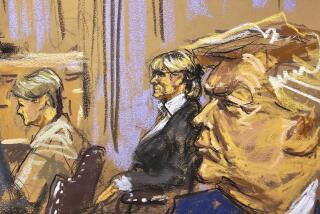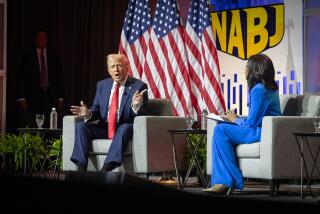Trump’s lawyers seek to discredit testimony of prosecution’s lead witness in hush money trial

- Share via
NEW YORK — Donald Trump’s defense team in his hush money case sought Friday to undermine the testimony of the prosecution’s lead witness and his account that a tabloid’s practice of helping to bury embarrassing stories about Trump was part of a scheme to aid the Republican’s 2016 campaign.
Returning to the witness stand for a fourth day, former National Enquirer publisher David Pecker was grilled about his memory and past statements as the defense tried to poke holes in potentially crucial testimony for prosecutors in the first criminal trial of a former American president.
Pecker’s testimony has provided jurors with a stunning inside look at the supermarket tabloid’s “catch-and-kill” practice of purchasing the rights to stories so they never see the light of day. It’s a critical building block for prosecutors’ theory that Trump sought to illegally influence the 2016 race by suppressing negative stories about his personal life.
Under cross-examination, Trump’s lawyers appeared to be laying the groundwork to make the argument that any dealings Trump had with Pecker were intended to protect Trump, his reputation and his family — not his campaign.
Supreme Court may not rule for Trump, but it could give him a win by putting off his trial until after the election.
The defense also sought to show that the tabloid was publishing negative stories about Trump’s 2016 rival, Hillary Clinton, long before the August 2015 meeting among Trump, Pecker and then-Trump attorney Michael Cohen. Pecker said that’s when he agreed to help Trump’s campaign.
Under questioning by Trump lawyer Emil Bove, Pecker acknowledged there was no mention at that meeting of the term “catch-and-kill.” Nor was there discussion at the meeting of any “financial dimension,” such as the National Enquirer paying people on Trump’s behalf for the rights to their stories, Pecker said.
Bove also confronted Pecker with statements he made to federal prosecutors in 2018 that the defense lawyer said were “inconsistent” with the former publisher’s testimony.
Pecker told jurors that Trump thanked him during a White House visit in 2017 for his help burying two stories. But according to notes Bove read in court, Pecker told federal authorities that Trump did not express any gratitude to him during the meeting.
“Was that another mistake?” Bove asked Pecker.
Former President Trump ping-ponged among a dizzying array of court appearances, judicial rulings, competing allegations and subsequent grievances.
Pecker stuck to the account that he gave in court, adding: “I know what the truth is.”
As Bove wrapped up his cross-examination Friday afternoon, Pecker told jurors: “I’ve been truthful, to the best of my recollection.”
The second witness called to the stand was Rhona Graff, Trump’s longtime executive assistant. Graff, who started working for Trump in 1987 and left the Trump Organization in April 2021, has been described as his gatekeeper and right hand.
Graff testified that the Trump Organization’s Outlook computer system included contact information for Stormy Daniels and Karen McDougal, two women who were paid to prevent them from coming forward with claims of sexual encounters with Trump. Trump says the claims were lies.
Graff also testified that she once saw Daniels in a reception area at Trump Tower, though the date of the visit wasn’t immediately clear. Graff said she assumed Daniels was there to discuss potentially being a contestant on one of Trump’s “Apprentice”-brand TV shows.
Trump spoke briefly to Graff as she left the witness stand. He appeared to reach out to her with his hand as an officer guided her away from the witness stand past the defense table. Trump’s lawyers were at the bench, talking with Judge Juan M. Merchan, when Trump stood up and engaged with Graff.
The testimony caps a consequential week in the criminal cases the former president faces as he tries to reclaim the White House in November.
At the same time jurors listened to testimony in Manhattan, the Supreme Court on Thursday signaled it was likely to reject Trump’s sweeping claims that he is immune from prosecution in his 2020 election interference case in Washington. But the conservative-majority high court seemed inclined to limit when former presidents could be prosecuted — a ruling that could benefit Trump by delaying that trial, potentially until after the November election.
In the New York case — the first of Trump’s four criminal cases to go to trial — the presumptive Republican presidential nominee faces 34 felony counts of falsifying business records in connection with hush money payments meant to stifle negative stories from surfacing in the final days of the 2016 campaign.
Trump denies any wrongdoing. Before entering the courtroom Friday, he told reporters he believes Thursday’s proceedings went “very well” for the defense, adding that “the case should be over.”
The charges center on $130,000 in payments that Trump’s company made to Cohen. He paid that sum on Trump’s behalf to keep Daniels, a porn actor, from going public with her claims of a sexual encounter with Trump a decade earlier.
Over several days on the witness stand, Pecker described how he and the tabloid parlayed rumor-mongering into splashy stories that smeared Trump’s opponents and, just as crucially, leveraged his connections to keep seamy stories about Trump secret.
Trump’s attorney zeroed in on a nonprosecution agreement in 2018 between the federal government and American Media Inc., the parent company of the National Enquirer.
The company admitted to engaging in the catch-and-kill practice to help Trump’s campaign, and prosecutors agreed to not prosecute the company for paying $150,000 to McDougal for the rights to the Playboy model’s story about an alleged affair with Trump.
Trump’s attorney repeatedly suggested that Pecker may have felt pressured to accept an agreement in order to finalize a deal to sell his company to the newsstand operator Hudson News Group for a proposed $100 million.
“To consummate that deal, you knew you had to clear up the investigations,” Bove said.
After pausing for several seconds, Pecker replied in the affirmative. But Pecker also said he felt “no pressure” to finalize the nonprosecution agreement to complete the transaction.
In the end, the deal didn’t go through.
Sisak, Peltz, Offenhartz and Richer write for the Associated Press.
More to Read
Get the L.A. Times Politics newsletter
Deeply reported insights into legislation, politics and policy from Sacramento, Washington and beyond. In your inbox three times per week.
You may occasionally receive promotional content from the Los Angeles Times.












